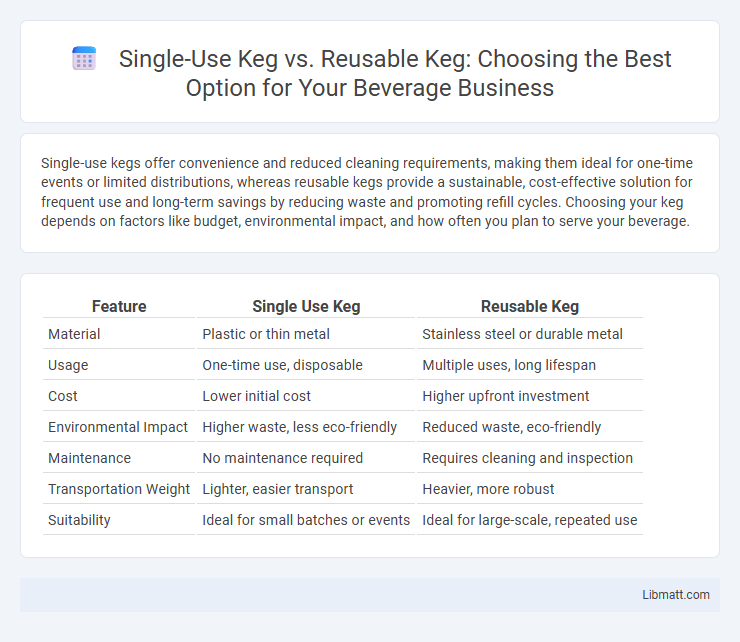Single-use kegs offer convenience and reduced cleaning requirements, making them ideal for one-time events or limited distributions, whereas reusable kegs provide a sustainable, cost-effective solution for frequent use and long-term savings by reducing waste and promoting refill cycles. Choosing your keg depends on factors like budget, environmental impact, and how often you plan to serve your beverage.
Table of Comparison
| Feature | Single Use Keg | Reusable Keg |
|---|---|---|
| Material | Plastic or thin metal | Stainless steel or durable metal |
| Usage | One-time use, disposable | Multiple uses, long lifespan |
| Cost | Lower initial cost | Higher upfront investment |
| Environmental Impact | Higher waste, less eco-friendly | Reduced waste, eco-friendly |
| Maintenance | No maintenance required | Requires cleaning and inspection |
| Transportation Weight | Lighter, easier transport | Heavier, more robust |
| Suitability | Ideal for small batches or events | Ideal for large-scale, repeated use |
Introduction to Single Use and Reusable Kegs
Single use kegs are designed for one-time use and are typically made from lightweight materials like plastic or aluminum, offering convenience and sanitation without the need for cleaning. Reusable kegs are constructed from durable stainless steel or heavy-duty materials, designed to withstand multiple cycles of filling, cleaning, and transportation, making them environmentally friendly and cost-effective over time. Your choice between single use and reusable kegs depends on factors such as usage frequency, sustainability goals, and budget considerations.
Overview of Keg Types and Materials
Single use kegs are typically made from lightweight aluminum or plastic, designed for one-time use and cost-effectiveness, while reusable kegs are constructed from durable stainless steel to withstand multiple cleaning and refilling cycles. Single use kegs offer convenience and reduce cross-contamination risks but generate more waste, whereas reusable kegs provide long-term sustainability and better temperature control. Your choice between single use and reusable kegs depends on factors like budget, environmental impact, and frequency of use.
Cost Comparison: Single Use vs Reusable Kegs
Single use kegs typically offer lower upfront costs compared to reusable kegs, making them ideal for short-term or limited distribution scenarios. Reusable kegs involve higher initial investment but provide significant savings over time through multiple usage cycles, lowering cost per use. Businesses must weigh single use keg affordability against the long-term economic efficiency and environmental impact of reusable kegs.
Environmental Impact and Sustainability
Single use kegs generate significantly more waste and contribute to higher carbon emissions due to their disposable nature, whereas reusable kegs support sustainability by reducing landfill waste and conserving resources through repeated use. The production and transportation of single use kegs demand more energy, while reusable kegs lower the environmental footprint by enabling multiple refill cycles and efficient logistics. Choosing reusable kegs helps your business minimize environmental impact and align with sustainable practices.
Logistics and Storage Considerations
Single-use kegs offer lightweight, space-efficient packaging, reducing transportation costs and minimizing storage space due to their collapsible design after use. Reusable kegs require more robust handling logistics, including return shipments, cleaning, and maintenance, which demands dedicated storage facilities and increases operational complexity. Choosing between the two depends on your supply chain capacity, turnaround times, and storage infrastructure availability.
Cleaning and Maintenance Requirements
Single use kegs require no cleaning or maintenance, as they are discarded after use, making them ideal for ensuring consistent hygiene and reducing labor costs. Reusable kegs demand rigorous cleaning protocols, including sanitization and inspection after each use to prevent contamination and maintain product quality. Your operation's choice between these options depends on balancing convenience with long-term cost efficiency and environmental impact.
Quality Control and Beverage Freshness
Reusable kegs offer superior quality control by enabling thorough cleaning and sanitization processes, reducing the risk of contamination and preserving beverage freshness more effectively than single-use kegs. Single-use kegs, while convenient, may lack the rigorous quality assurance steps that guarantee consistent flavor and aroma retention over time. Choosing reusable kegs ensures your beverage maintains optimal taste and freshness through multiple usage cycles with controlled hygiene standards.
Regulatory and Compliance Factors
Single use kegs must comply with specific food safety regulations and are subject to disposal and recycling standards that vary by region, often requiring certification for materials used. Reusable kegs must meet stringent cleaning and sanitation protocols to ensure they comply with health and safety regulations, reducing contamination risks and maintaining beverage quality. Regulatory bodies emphasize traceability and quality control measures for reusable kegs, often mandating regular inspections and documentation to comply with industry standards.
Industry Trends and Market Preferences
The beverage packaging industry increasingly favors reusable kegs due to sustainability demands and cost efficiency, driving a shift in market preferences from single-use kegs. Growing regulations targeting plastic waste and carbon footprint reduction further accelerate this trend, with many breweries adopting reusable systems to align with eco-conscious consumers. Market data shows a significant rise in reusable keg adoption, particularly in the craft beer sector, reflecting an industry-wide commitment to circular economy principles.
Choosing the Right Keg for Your Business
Selecting the right keg for your business depends on factors such as cost, sustainability, and operational efficiency. Single-use kegs offer convenience and lower initial investment, ideal for short-term events or small-scale operations, while reusable kegs provide long-term savings and environmental benefits through multiple refill cycles. Analyzing your distribution volume, storage capacity, and customer preferences ensures optimal keg choice for maximizing business returns.
Single use keg vs reusable keg Infographic

 libmatt.com
libmatt.com